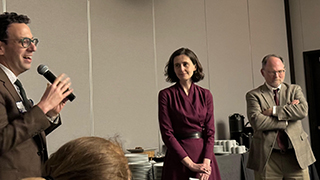Law Professor Doron Dorfman Receives Employment Law Rising Scholar Award
Friday, November 3, 2023

Professor Doron Dorfman receiving the Zimmer Award from Professor Charlotte Garden and Professor Matthew Bodie, the organizers of the 18th Annual Colloquium on Scholarship in Employment and Labor Law at the University of Minnesota Law School.
Seton Hall Law Professor Doron Dorfman received the Michael J. Zimmer Memorial Award for a rising scholar who has made a significant contribution to the field of work law. The award was bestowed upon Dorfman at the Colloquium on Scholarship in Employment & Labor Law at the University of Minnesota Law School.
The Annual Colloquium on Scholarship in Employment and Labor Law is the professional gathering of legal scholars in the fields of employment and labor law. The Colloquium gives both emerging and establishing labor and employment scholars an opportunity to gather with colleagues to present their work to an expert audience. This year, it met for the 18th time and awarded Dorfman the coveted Zimmer Award.
In bestowing the award, Matthew Bodie, Robins Kaplan Professor of Law, University of Minnesota Law School, said: “Professor Dorfman has already established himself as an important voice in health law and employment law scholarship. We are very excited to honor him with this award recognizing his great work and his amazing promise as a scholar.”
About the Award
The Zimmer Award is for “a rising scholar who values workplace justice and community, and who has made significant contributions to the field of labor and employment law scholarship." This award was named after the late Michael Zimmer, who was a professor of law at both Seton Hall University School of Law (from 1978 to 2008 and serving as Associate Dean from 1990 to 1994) and Loyola University Chicago School of Law. He was a renowned expert on employment discrimination law, labor and employment law, and constitutional law.
In a tribute to Professor Zimmer which appeared in the Loyola University Chicago Law Journal, Seton Hall Law Professor Emeritus Charles Sullivan (who collaborated with Zimmer on eight editions of a casebook on employment discrimination, three editions of a treatise on the same topic, one employment law casebook, and “assorted odd articles”), noted that Zimmer was “fearless in his pursuit of what he believed to be right” and “visionary in his approach to teaching and scholarship, bubbling with innovative ideas, and passionate in transforming the institutions he served.”
“I am incredibly honored and humbled to have received the Zimmer award,” said Dorfman. “I work in the areas of employment law, health law, and disability law, making the connections between fields that affect all our lives. Being recognized by renowned scholars who I admire means the world to me, specifically as someone who crosses fields. I hope to continue making impact in the lives of workers, patients, and disability communities within the academy and beyond.”
At the colloquium, Professor Dorfman presented his new work-in-progress titled Third Party Accommodations.
NEJM
Earlier this year, Dorfman published "Approving Workplace Accommodations for Patients with Long Covid — Advice for Clinicians" in The New England Journal of Medicine. The article, written with co-author, Zackary Berger M.D., of Johns Hopkins School
of Medicine, is geared toward medical professionals faced with issues regarding specific
diagnosis for long Covid (also known as post-acute sequelae of Covid-19) often requisite
for employer work accommodation forms and disability claims. The implications for
employers, HR professionals, attorneys and employees are, the authors note, significant
– especially given the estimated prevalence of the condition (11% of those acutely
infected) and the guidance released in August 2021 by the Department of Health and
Human Services and the Department of Justice, [stating that] long Covid can be considered
a protected disability under the Americans with Disabilities Act (ADA) and under other
disability-antidiscrimination mandates (such as Section 504 of the Rehabilitation
Act and Section 1557 of the Affordable Care Act).
The article, tailored to clinicians, further instructs on the use of the pertinent diagnostic codes to properly classify long Covid in those patients thus impacted.
Categories: Law






